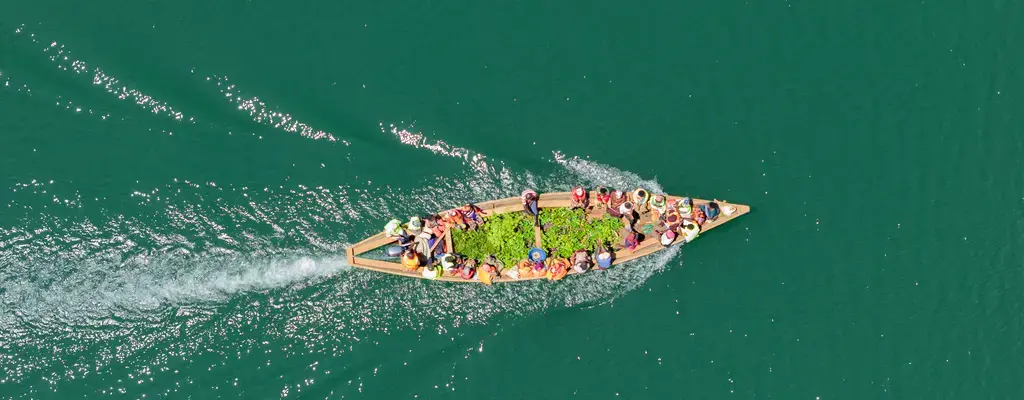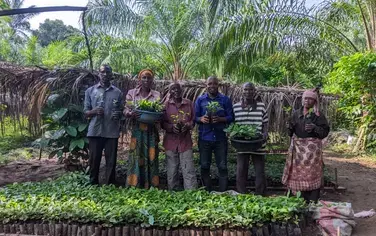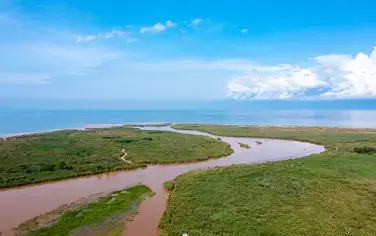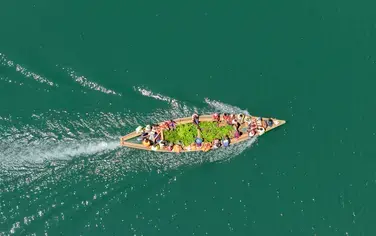By Bernadette Arakwiye, Edna Kalima, Diana Mawoko, Duncan Okowa, Kalpana Giri, and Mercy Orengo. Cover image: Serrah Galos/WRI
Restoring Africa's landscapes requires a holistic approach that addresses ecological, social, and economic dimensions. Inclusive and effective policies provide the foundation for sustainable management by aligning restoration efforts with national development goals, creating incentives for communities and private actors, and ensuring compliance with restoration commitments. Gender and social equity are equally vital as they empower marginalized groups, especially women, who often play key roles in land stewardship but face systemic barriers to access resources, decision-making, and benefits. Together, these elements create a restoration process that is equitable, resilient, and capable of delivering long-term impacts for both people and nature.
These themes – Policy and Gender and Social Equity emerged as two key priorities crucial to the success of restoration efforts during the African Forest Landscape Restoration (AFR100) 8th Annual Partnership Meeting (APM8) convened in Tanzania in July 2024. AFR100, a country-led initiative, which aims to restore 100 million hectares of degraded land by 2030, has made substantial progress with support from technical and financial partners. APM8 brought community leaders, government officials and experts from across Africa to tackle the continent’s environmental challenges. The meeting focused on finding practical solutions to restore Africa’s degraded and deforested landscapes and underscored that without effective policies and inclusive approaches, restoration efforts might not achieve their full potential.
The Power of Strong Policies
Policies matter. For years, the lack of clear and supportive policies and ineffective implementation has been a stumbling block for many restoration projects across the continent. Without a clear and stable policy framework, it’s hard for communities, businesses, and governments to commit to long-term investments in forest landscape restoration. That is why the newly launched AFR100 Policy Working Group was such a highlight of APM8. This group is dedicated to collaborating with member countries to develop the clear restoration goals that everyone—from local farmers to international investors—can rally around.
Imagine being a farmer who wants to restore a piece of land, but without a clear land use policy, you fear that your efforts might go to waste if the land's designation changes. Effective policies can prevent that uncertainty. They can also provide incentives, like tax breaks or grants, to encourage businesses and landowners to actively participate in the restoration movement. In countries like Rwanda and Ethiopia, policy changes have already started to pay off. Rwanda’s revised National Forest Policy and Ethiopia’s Climate-Resilient Green Economy Strategy show how strong policies can be a catalyst for real change.
Restoration for All: The Role of Gender and Social Equity
But there’s another piece to the puzzle. Restoration isn’t just about trees—it’s also about people. The APM8 meeting showcased why gender and social equity (GSE) are not just nice-to-have but essential for sustainable restoration. For decades, women, youth, and other marginalized groups have been sidelined in decision-making processes that directly affect them.
The AFR100 Gender Equity Platform, introduced at APM8, is a groundbreaking step towards ensuring everyone has a voice in restoration efforts. Picture a young woman in Malawi, once excluded from discussions about how her community’s land should be managed. Now, thanks to initiatives like Forest Management Agreements, she and her neighbors are empowered to sustainably manage forests, with economic incentives that support both ecological and social goals. This isn’t just good for women—it’s good for everyone. Inclusive decision-making leads to more creative solutions, stronger community buy-in, and ultimately, more successful restoration.
A Movement Gaining Momentum
AFR100’s story is one of progress and promise. With 34 member countries committed to restoring over 129.5 million hectares—exceeding the original goal—the initiative is already seeing results. Partnerships with organizations like the World Resources Institute (WRI) , International Union for Conservation of Nature (IUCN), Deutsche Gesellschaft für Internationale Zusammenarbeit (GIZ) and AUDA-NEPAD have been crucial in supporting countries with both policy development and GSE integration. It’s not just about putting plans on paper; it’s about bringing them to life.
For instance, in Kenya, pilot projects supported by WRI’s Landscape Policy Accelerator are creating blueprints that can inspire other AFR100 member countries. Additionally, in Ethiopia, public-private partnerships are leading the way in restoration. These stories are a testament to the power of collaboration and the importance of both policy and equity in achieving lasting change.
Driving AFR100 Vision: Harnessing Policy and Gender Equity to accelerate Restoration
AFR100’s ambitious goals are achievable with the right tools. The newly formed Policy Working Group and the Gender Equity Platform will be impactful if effectively utilized. We call upon restoration actors within AFR100 to leverage these structures for breaking down barriers and, creating enabling environments, particularly for the growing grassroot movement driving restoration action on-the-ground. By addressing systemic gaps in the restoration ecosystem and implementing locally tailored solutions, AFR100 can ensure restoration is both inclusive and sustainable.
As AFR100 pushes forward, the focus remains on sharing success stories, learning from setbacks, and building a future that’s as diverse and dynamic as the continent itself. It’s a vision worth fighting for—a vision where policy and equity go hand in hand to boost restoration efforts.
Contact
- If you need more information about the AFR100 Gender Equity Platform, Reach out to Edna Kalima: EdnaK@nepad.org
- For the AFR100 Policy Working Group, reach out to Benjamin Akobundu: AkobunduB@nepad.org




